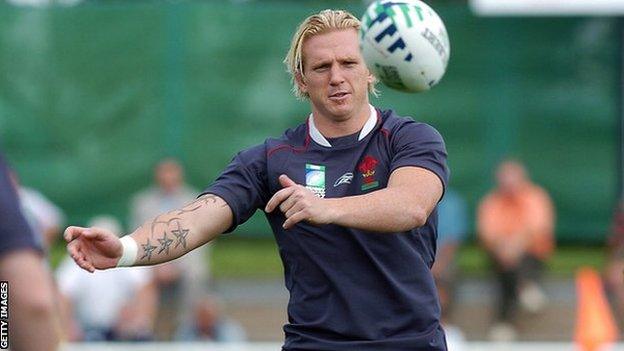Rugby season should be cut in half to protect players, says Alix Popham
- Published

Alix Popham retired from professional rugby in 2011
Former Wales forward Alix Popham says the rugby union season needs to be cut in half in order to protect players from brain injuries.
Popham, 42, was diagnosed with early onset dementia in 2019.
He is one of 185 players suing rugby union's governing bodies for negligence, claiming that playing the sport caused brain damage.
"We have got to be able to control how much contact players do," Popham told BBC Radio 4's World at One.
Ex-Wales captain Ryan Jones and England World Cup winner Steve Thompson are among the group of former players taking legal action against World Rugby, the Rugby Football Union (RFU) and the Welsh Rugby Union (WRU), who are accused of failing to "protect players from permanent injury".
A joint statement issued by World Rugby, the RFU and WRU said they were united in their desire to protect past and present players.
"We care deeply about all our players, including former players, and never stand still when it comes to welfare," it said.
"Our strategies to prevent, identify and manage head injuries are driven by a passion to safeguard our players and founded on the latest science, evidence and independent expert guidance."
Popham won 33 caps for Wales between 2003 and 2008, and played club rugby for Newport, Leeds, Llanelli and Brive.
"I still love rugby but it is a dangerous sport," he said.
"There's lots that needs to be done to make rugby as safe as it possibly can [be].
"The season needs to be cut in half, the amount of contact players do during the week needs to be limited.
"They have brought in guidelines but, speaking to current players, nobody is sticking to those current guidelines."
Popham says he is "doing everything" possible to stay as healthy as he can, including using brain-training apps.
"I have three daughters - Holly who's 18, Isobel 14 and Darcy who's just turned four," he said. "Trying to be here as me for as long as possible is the plan."
The former back row said he was never spoken to "at length [about] the dangers of hitting your head over and over again".
"I was [playing during] one of the first years of professional rugby," he added.
"I went from training on a Tuesday, Thursday and playing on a Saturday to training every day, nine to five, and we did so much contact.
"Every day when we were doing contact sessions and we were seeing stars and had to have sniffing salts or spray water in your face to come round, they were traumatic brain injuries which were causing damage and needed the correct rest to give my brain time to heal.
"That's what current players are still not doing."